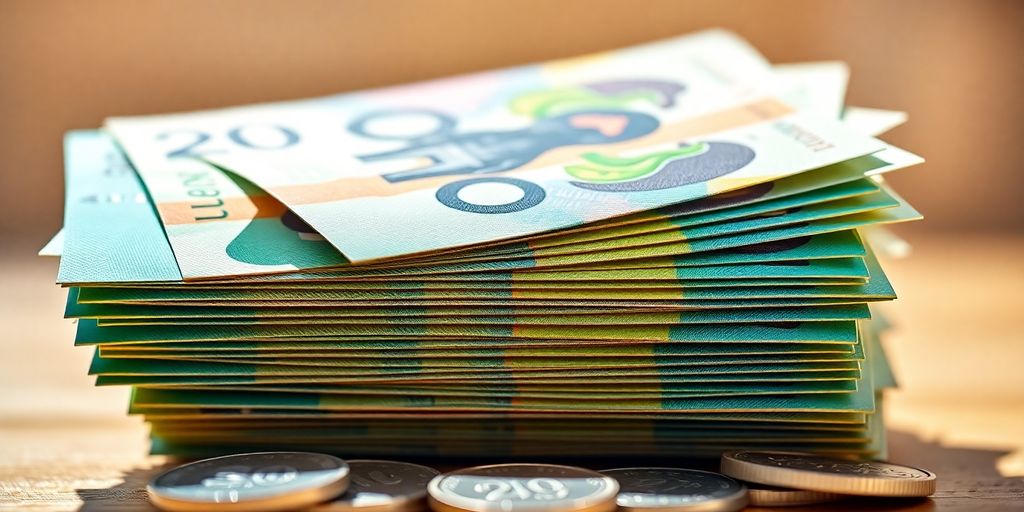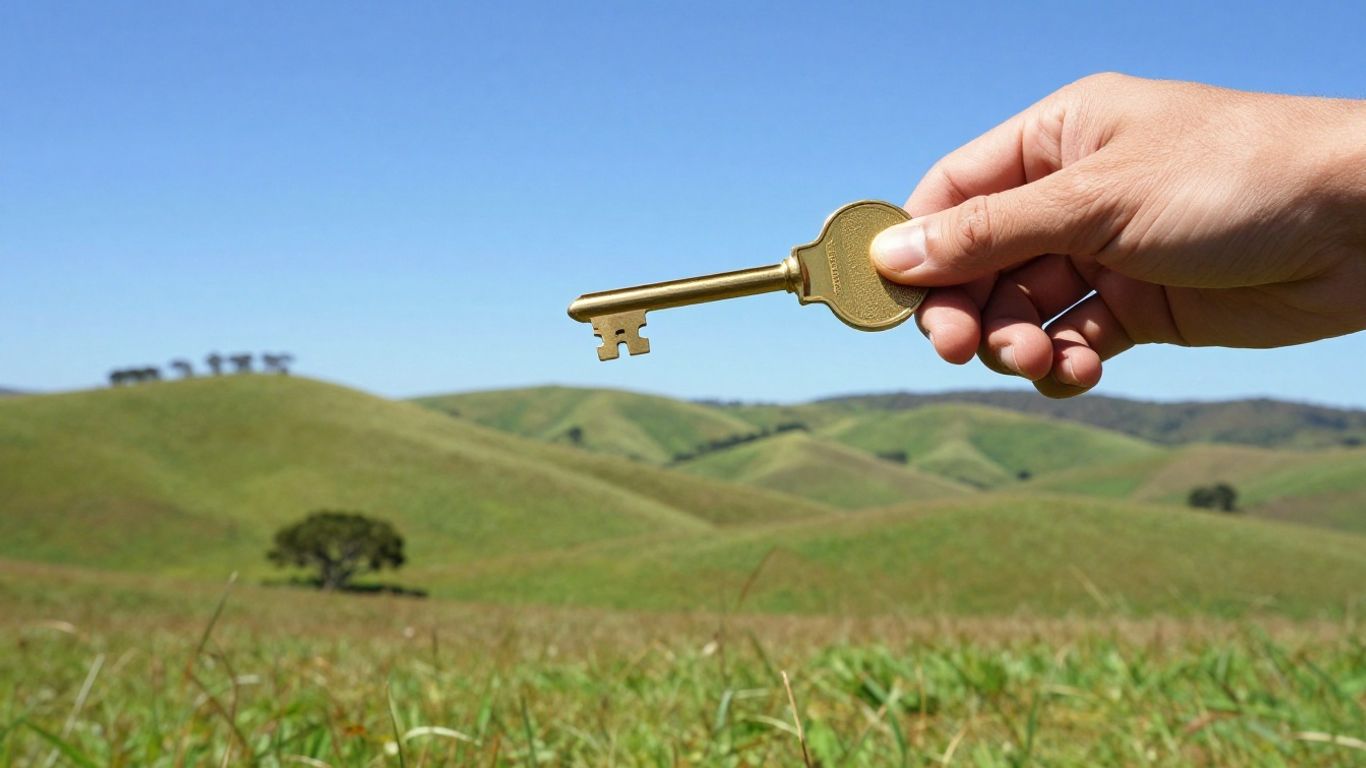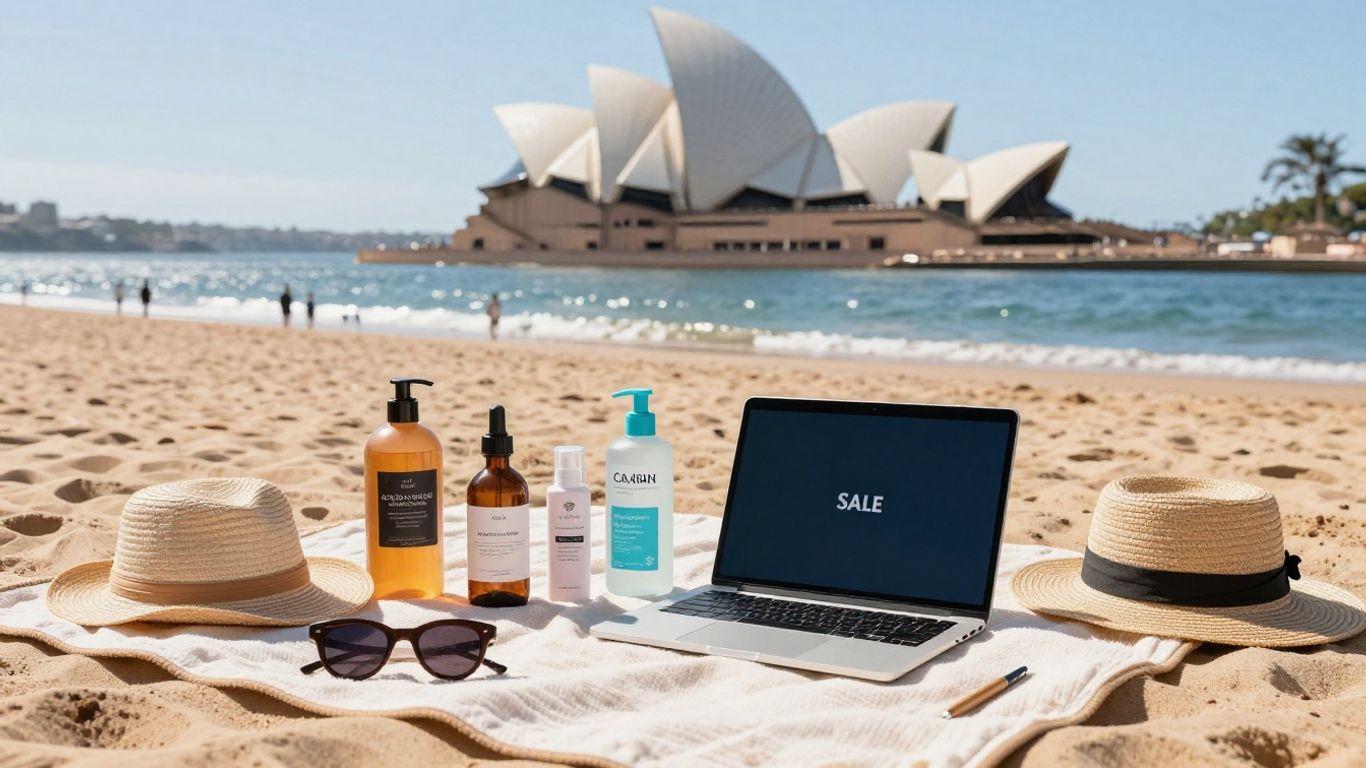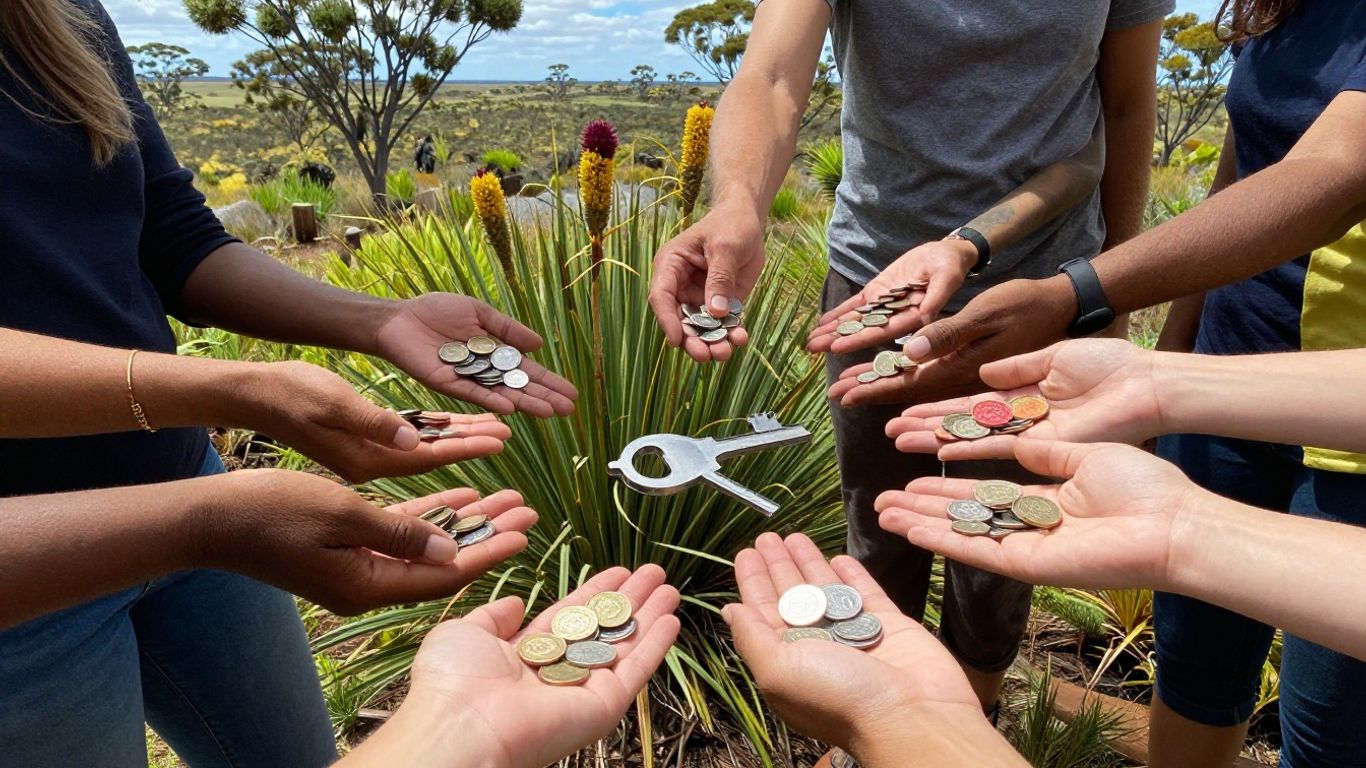G’day, mates! Ever feel like your hard-earned cash just vanishes into thin air? You’re not alone. With everything getting pricier, it’s easy to feel the pinch. But don’t you worry, I’ve got some fair dinkum money saving tips for Aussies that’ll help you keep more dosh in your pocket in 2025. We’re talking about smart ways to cut down on costs without feeling like you’re missing out on the good stuff. Let’s get stuck into it and make your money work harder for you!
Key Takeaways
- Small changes in how you spend can really add up over time.
- Being smart with your money doesn’t mean you can’t have a good time.
- There are heaps of Aussie-specific ways to save a few bucks.
- You can live well and still be good with your finances.
- Learning a few new skills can save you heaps in the long run.
Mastering Your Tucker Budget

Let’s be honest, Aussies love their tucker. But those meat pies and sausage rolls can really add up! Mastering your food budget is key to saving some serious dosh. It’s all about being a bit savvy at the shops and getting creative in the kitchen.
Smart Choices at the Supermarket
Supermarkets can be a minefield of temptations. Here’s how to navigate them like a pro:
- Make a list and stick to it: This is the golden rule. Plan your meals for the week and only buy what you need. Impulse buys are the enemy!
- Compare prices: Don’t just grab the first thing you see. Check unit prices to see which option is actually cheaper. Supermarkets often have weekly specials, so keep an eye out for those.
- Shop seasonally: Fruit and veggies that are in season are usually cheaper and taste better. Plus, you’re supporting local farmers!
- Don’t shop hungry: Everything looks good when you’re hungry. Have a snack before you go to avoid those impulse buys.
Home-Cooked Meals for the Win
Eating out is a massive drain on your wallet. Cooking at home is almost always cheaper, and it can be fun too! Here’s how to make the most of it:
- Plan your meals: This is the most important step. Knowing what you’re going to cook each night makes shopping easier and reduces food waste.
- Cook in bulk: Make a big batch of something like pasta sauce or soup and freeze it in portions. This is a lifesaver on busy weeknights.
- Use leftovers: Turn last night’s roast chicken into sandwiches or a stir-fry. Get creative!
- Embrace cheap ingredients: Things like lentils, beans, and rice are super cheap and versatile. They can be used in all sorts of dishes.
Cutting Down on Takeaway Treats
Takeaway is convenient, but it’s also expensive. Here’s how to curb your takeaway habit:
- Set a limit: Decide how much you’re willing to spend on takeaway each week and stick to it.
- Find healthy alternatives: If you’re craving something sweet, try making your own healthy treats at home. There are heaps of recipes online.
- Plan ahead: If you know you’re going to be busy, make sure you have a healthy meal prepared so you’re not tempted to order takeaway.
- Treat takeaway as a treat: Don’t make it a regular thing. Save it for special occasions.
It’s easy to justify a small purchase, thinking it’s just a few dollars. But these small, frequent expenditures are often the silent killers of a good budget. They chip away at your savings without you even realising it, like a thousand tiny leaks in a bucket. Being mindful of every dollar, no matter how small, is key to keeping your finances on track.
Savvy Spending on Your Wheels

Owning a car, or even a ute, can be a real money pit if you’re not careful. Between petrol, rego, insurance, and the occasional repair, it all adds up quicker than you think. But don’t stress, there are plenty of ways to keep those costs down and still enjoy the freedom of having your own set of wheels.
Fueling Up Without Breaking the Bank
Fuel is usually the biggest ongoing expense when it comes to your car. Prices can fluctuate wildly, so it pays to be strategic about when and where you fill up.
- Download a fuel price app. These apps show you the cheapest petrol stations in your area in real-time. It’s a no-brainer for saving a few bucks every time you fill up.
- Fill up on quieter days. Avoid weekends and public holidays when prices tend to spike. Early in the week is often the best time to find cheaper fuel.
- Consider joining a loyalty programme. Many petrol stations offer loyalty programmes that give you discounts on fuel or other perks. If you drive a lot, these can add up to significant savings.
It’s easy to justify a small purchase at the servo, thinking it’s just a few dollars. But these small, frequent expenditures are often the silent killers of a good budget. They chip away at your savings without you even realising it, like a thousand tiny leaks in a bucket. Being mindful of every dollar, no matter how small, is key to keeping your finances on track.
DIY Car Maintenance Hacks
Instead of running to the mechanic for every little thing, why not try your hand at some basic car maintenance? You’d be surprised how much you can save by doing it yourself.
- Check your oil regularly. Low oil can damage your engine, leading to costly repairs. Topping it up yourself is easy and cheap.
- Inflate your tyres properly. Correct tyre pressure improves fuel efficiency and extends the life of your tyres. Most servos have air pumps you can use.
- Replace your own windscreen wipers. It’s a simple job that takes just a few minutes and can save you a trip to the mechanic.
Rethinking Your Ute Needs
The trusty ute. It’s practically an Aussie icon, isn’t it? More than just a vehicle, it’s a workhorse, a weekend warrior, and for many, a second home. But owning one, especially a new one, can really chew through your hard-earned cash if you’re not careful. We’re talking about everything from the initial purchase price to ongoing maintenance and, let’s be honest, the fuel bill. Those big engines love a drink.
- Do you really need a brand new ute? Consider buying a used one in good condition. You’ll save a heap on the initial purchase price.
- Think about downsizing. If you don’t need a massive ute, a smaller, more fuel-efficient vehicle might be a better option.
- Carpool or share rides. If you only use your ute occasionally, consider carpooling with mates or sharing rides to save on fuel and wear and tear.
Budgeting Like a True Blue Aussie
Budgeting doesn’t have to be a drag. Think of it as taking control of your hard-earned dosh so you can actually enjoy life without constantly stressing about bills. It’s about making your money work for you, not the other way around.
Getting Started with a Simple Budget
Right, first things first, let’s keep it simple. You don’t need a fancy spreadsheet or a degree in accounting to get started. Grab a notebook, or use a basic app, and list your income and expenses. Be honest with yourself – no hiding those sneaky takeaway coffees! Once you know where your money is going, you can start making informed decisions.
Here’s a basic template to get you started:
| Category | Estimated Cost | Actual Cost |
|---|---|---|
| Rent/Mortgage | $XXX | $XXX |
| Groceries | $XXX | $XXX |
| Transport | $XXX | $XXX |
| Entertainment | $XXX | $XXX |
| Utilities | $XXX | $XXX |
| Other | $XXX | $XXX |
| Total Expenses | $XXX | $XXX |
Top Budgeting Apps for Aussies
There are heaps of budgeting apps out there, but some are better suited to Aussies than others. Look for apps that:
- Connect seamlessly with Australian banks. Seamless connection is key for automatic tracking.
- Handle AUD without any dramas.
- Understand Aussie spending habits – from your flat white to your Bunnings snag.
A good budgeting app should be easy to use, secure, and tailored to the Australian financial landscape. It should help you track your spending, set goals, and identify areas where you can save money.
Asper is a great option, built by Aussies, for Aussies. It even roasts your transactions to keep things interesting! You can also check out other popular apps like Pocketbook or Frollo. The best budgeting app in Australia for 2025 is the one you’ll actually use, so give a few a crack and see what works for you.
Understanding Where Your Dosh Goes
This is where things get real. Tracking your spending can be a bit of an eye-opener. You might be surprised at how much you’re actually spending on certain things. Once you know where your money is going, you can start to identify areas where you can cut back.
Here are a few tips:
- Use a budgeting app to automatically track your spending.
- Review your bank statements regularly.
- Categorise your expenses to see where your money is going.
- Identify areas where you can cut back.
- Set realistic spending limits for each category.
Frugal Fun and Entertainment
Barbecue on a Budget
Let’s be honest, Aussies love a barbie! But those snags and steaks can add up. The trick is to plan ahead and be a bit savvy. Instead of buying the most expensive cuts of meat, opt for cheaper options like sausages or chicken thighs. They’re just as tasty when marinated right. Bulk out the meal with some homemade salads – a simple coleslaw or potato salad is way cheaper than buying pre-made tubs from the supermarket. Don’t forget the bread rolls; they’re perfect for soaking up all those delicious juices.
- Buy in bulk when meat is on special and freeze it for later.
- Make your own marinades and sauces – they taste better and are cheaper.
- Grow your own herbs to add flavour without the cost.
Remember, a barbie is about good company and good times, not about showing off how much you can spend. Keep it simple, keep it fun, and your wallet will thank you.
Free and Low-Cost Activities
Australia’s got heaps of free stuff to do, you just gotta know where to look! Hit the beach – swimming, surfing, or just soaking up the sun is completely free. Check out your local parks and gardens for a picnic or a bushwalk. Many cities and towns have free events and festivals throughout the year, so keep an eye on the local council website. Libraries are also a goldmine – borrow books, movies, and even attend free workshops. You can find local events happening near you.
- Explore national parks – many have free entry days.
- Go for a bike ride along a scenic route.
- Visit local museums and art galleries – some offer free admission.
Making the Most of Local Deals
Don’t be shy about hunting for a bargain! Sign up for newsletters from local businesses and restaurants to get notified about special offers and discounts. Check out websites like Groupon or Scoopon for deals on activities, dining, and entertainment. Many cinemas offer cheaper tickets on certain days of the week, so plan your movie nights accordingly. And don’t forget about your local community noticeboard – you might find some hidden gems there. Being thrifty doesn’t mean missing out; it just means being smart about how you spend your hard-earned cash.
Smart Home Savings
Reducing Your Energy Bills
Alright, let’s yarn about cutting down those pesky energy bills. It’s not just about being green; it’s about keeping more dosh in your pocket. One of the easiest wins is switching to energy-efficient light globes. Those old incandescent ones are energy guzzlers. LEDs are the way to go – they last longer and use way less power.
Here’s a few more ideas:
- Unplug appliances: Don’t leave your telly, microwave, or phone charger plugged in when you’re not using them. They still suck power even when they’re off. It’s called "phantom load," and it’s a sneaky bill booster.
- Smart power strips: Get yourself some smart power strips. They can detect when an appliance isn’t in use and cut off the power supply.
- Check your insulation: Make sure your home is properly insulated. This will keep it warmer in winter and cooler in summer, reducing the need for heating and cooling.
I remember when I finally got around to insulating my roof. The difference was huge! My energy bills dropped by almost 30%. It’s an investment that pays for itself pretty quickly.
Water-Wise Habits for Your Wallet
Water bills can be a real killer, especially during those scorching Aussie summers. But there are plenty of ways to be water-wise without sacrificing your lifestyle.
- Shorten your showers: Aim for a four-minute shower. It might not sound like much, but it can save a surprising amount of water.
- Fix leaky taps: A dripping tap might seem like a minor annoyance, but it can waste litres of water over time. Get it fixed pronto! Calling a plumber for every little thing can get pricey, quick. A lot of minor dunny issues can be sorted out with a bit of elbow grease and a YouTube tutorial.
- Install a water-efficient showerhead: These showerheads use less water without compromising water pressure.
Here’s a quick look at potential water savings from smart toilet habits:
| Action | Estimated Savings (per year) |
|---|---|
| Shortening shower by 2 min | Up to 5,000 litres |
| Fixing a leaky tap | Up to 2,000 litres |
| Water-efficient showerhead | Up to 10,000 litres |
DIY Home Fixes and Upgrades
Why pay someone else to do jobs you can handle yourself? There are heaps of simple home fixes and upgrades you can tackle with a bit of know-how and some elbow grease.
- Caulking and sealing: Seal up any cracks or gaps around windows and doors to prevent drafts. This will help keep your home warmer in winter and cooler in summer.
- Painting: A fresh coat of paint can do wonders for the look of your home. Plus, it’s a relatively easy and affordable DIY project.
- Basic plumbing: Learn how to fix a leaky tap or unclog a drain. These are skills that will save you money in the long run. Don’t forget building an emergency fund while you’re sorting your weekly shop—it’s a small step that pays off big time.
I used to call a handyman for every little thing, but then I realised I could do most of it myself with a bit of research and some basic tools. Now I’m saving a fortune!
Investing in Yourself for Future Savings
Learning Money-Saving Skills
Alright, so you reckon you’re saving money, eh? But are you really saving money, or just putting off spending? Investing in yourself is the best way to future-proof your finances. Think about it: the more you know, the less you have to pay someone else.
- Learn basic car maintenance. Changing a tyre or checking your oil can save you a trip to the mechanic.
- Get handy around the house. Fixing a leaky tap or painting a room yourself saves on tradie costs.
- Become a whiz in the kitchen. Cooking from scratch is way cheaper (and healthier) than ordering takeaway every night. Plus, you can learn to make some ripper home-cooked meals.
It’s easy to think of saving money as just cutting back, but learning new skills is like giving yourself a pay rise. You’re not just saving money; you’re earning it by doing things yourself.
Building an Emergency Fund
Life throws curveballs, mate. The fridge dies, the car needs repairs, or you lose your job. That’s where an emergency fund comes in. It’s your financial safety net, your billabong of cash for when the river runs dry.
Think of it this way:
| Scenario | Cost | Emergency Fund Coverage? | Stress Level |
|---|---|---|---|
| Car Breakdown | $500 | Yes | Low |
| Unexpected Bill | $200 | Yes | Low |
| Job Loss (1 month) | $3,000 | Yes | Manageable |
Automate your savings. Set up a direct debit to move a bit of cash into a separate savings account every payday. Out of sight, out of mind, and it builds up without you even thinking about it. This is like making your own billabong – a financial version, of course!
Avoiding Impulse Buys
Those sneaky impulse buys can really add up. You’re at the servo, grabbing a pie, and suddenly you’re walking out with a chocolate bar, a magazine, and a scratchie. Before you know it, you’ve blown 20 bucks on stuff you didn’t even need.
Here’s how to avoid the trap:
- Make a list before you go shopping and stick to it.
- Wait 24 hours before buying anything that isn’t essential.
- Unsubscribe from marketing emails that tempt you with deals.
It’s easy to get caught up in the moment and splash out, but a bit of foresight can save you a heap of grief down the track. Every little bit adds up, and before you know it, you’ve got a decent stash. It’s not about being stingy, it’s about being clever with your cash.
Wrapping It Up: Your Money, Your Rules
So there you have it. Getting your money sorted isn’t about being a tight-arse or missing out on fun. It’s about being smart with your cash so you can actually enjoy life without constantly stressing about bills. Think of these tips as a starting point, not a strict rulebook. Pick a few that make sense for you, give ’em a go, and see what happens. You might be surprised how much extra cash you find in your pocket. Every little bit helps, and before you know it, you’ll be feeling much better about your finances. Good on ya for giving it a crack!
Frequently Asked Questions
Are these tips only for city slickers, or can folks in regional areas use ’em too?
Nah, not really. While some tips might be more useful in the city, most of these money-saving ideas work no matter if you’re in Sydney or way out in the bush. It’s all about being smart with your cash, mate.
Will following these tips really make a big difference to my wallet?
Absolutely! Being thrifty isn’t just about saving a few bucks here and there; it’s about making your money go further so you can enjoy life more. Think of it as getting more bang for your buck.
I’m a bit overwhelmed. Where should I even begin with all this saving stuff?
It’s super easy to get started. Just pick one or two tips that seem simple to try first, like planning your meals or looking for deals. Once you get the hang of it, you can add more. No need to go all-in at once!
Does being frugal mean I can’t have any fun or buy anything nice?
Not at all! Being smart with your money means you can still have fun and buy nice things, but you do it in a clever way. It’s about making choices that fit your budget, not cutting out everything good. You can still have a ripper time without blowing all your cash.
I’ve never been good with money. Is it too late for me to start saving?
It’s never too late to start getting your finances in order. The best time to start was yesterday, the next best time is today! Every little bit you save adds up over time, so jump in whenever you’re ready.
Can small changes really make a big difference to my savings?
You bet! A lot of these tips are about making small changes that add up. Things like making your own coffee, packing your lunch, or finding free entertainment can save you a surprising amount over a year. Every dollar counts!





